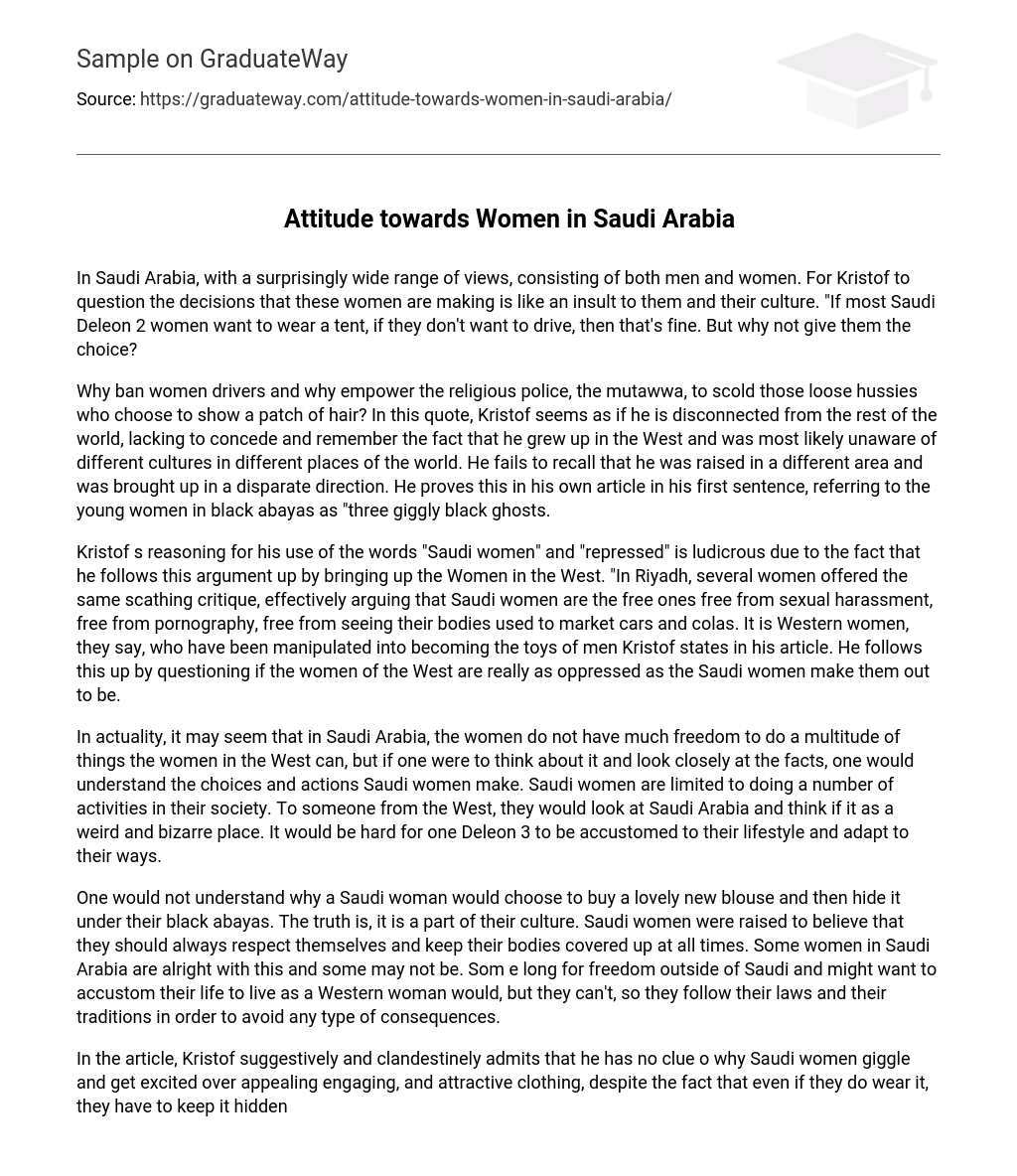In Saudi Arabia, both men and women have a surprisingly wide range of views. It is considered an insult to question the decisions these women are making and their culture. If most Saudi women want to wear a tent and choose not to drive, that should be respected. However, it is important to give them the choice.
Why ban women drivers and empower the religious police, the mutawwa, to scold those who show a patch of hair? In this quote, Kristof appears disconnected from the world, failing to acknowledge his Western upbringing and unfamiliarity with diverse cultures. He shows this in his own article by referring to young women in black abayas as “three giggly black ghosts”.
Kristof’s justification for using the terms “Saudi women” and “repressed” is illogical because he immediately contradicts himself by mentioning the Women in the West. According to his article, in Riyadh, a number of women strongly criticize this argument by stating that Saudi women are the ones who enjoy freedom from sexual harassment, pornography, and objectification for marketing purposes. Kristof claims that it is actually Western women who have been manipulated into becoming objects controlled by men. He then questions whether the alleged oppression of Western women is as severe as Saudi women portray it to be.
While it may appear that women in Saudi Arabia lack the freedom to engage in a variety of pursuits like their Western counterparts, a closer examination of the facts reveals that Saudi women make deliberate choices and take intentional actions. Their society imposes restrictions on the range of activities they can partake in. To individuals from the West, Saudi Arabia may seem peculiar and unusual. Adjusting and assimilating into their lifestyle would prove challenging.
The cultural practice of Saudi women concealing a new blouse under their black abayas may seem puzzling. However, this custom is deeply rooted in their upbringing and beliefs regarding self-respect and modesty. While some women in Saudi Arabia accept and embrace this tradition, others may yearn for greater freedom and the ability to live as Western women do. However, due to the laws and traditions in place, they adhere to these customs in order to avoid any potential repercussions.
The article by Kristof implies that he does not understand why Saudi women find joy and excitement in alluring and attractive clothing, even though they have to hide it beneath their cloaks. The truth is that women do not dress to please men, including Saudi women. Tracy Quan, in her response titled “Who’s Repressed?”, points out that educated American men are often ignorant about fashion – its history, theory, and even its practice. This is a burden that fashionable urban women have learned to bear.
Thank goodness we don’t actually dress for them! Women regularly dress for other women – a fact that Kristof appears to overlook, despite men complaining about this for generations. It is widely believed that the language Kristof uses in his essay is not only insulting to Saudi women but women in general. His criticisms of Saudi women, including referring to them as “giggly black ghosts” and consistently questioning their choices within their own culture, are viewed as a means of justifying further attacks that can have troubling consequences (Deleon 4).
It is common for laws and traditions to evolve with time. The laws and customs in America resemble those seen elsewhere globally. It is logical to comprehend that if Saudi women desired to dress attractively for others, they would not buy fashionable clothing only to hide it beneath their abayas. The act of dressing up should be solely about pleasing oneself, with no obligation to please anyone else. If an individual opts to wear a miniskirt but then conceals it under an abaya, there is nothing inherently incorrect about this choice. It could be influenced by personal preference or religious convictions.
If three Saudi women are seen peacefully conversing about clothing, would they always be perceived as “giggly black ghosts?” The perception depends on one’s upbringing, societal norms, traditions, and cultures. Is it truly uncommon to observe Saudi women and automatically assume they are oppressed? Saudi women have the freedom to make choices within the parameters of their culture, which can be advantageous at times. However, this does not necessarily imply that they feel repressed. At least not in their own perception.





